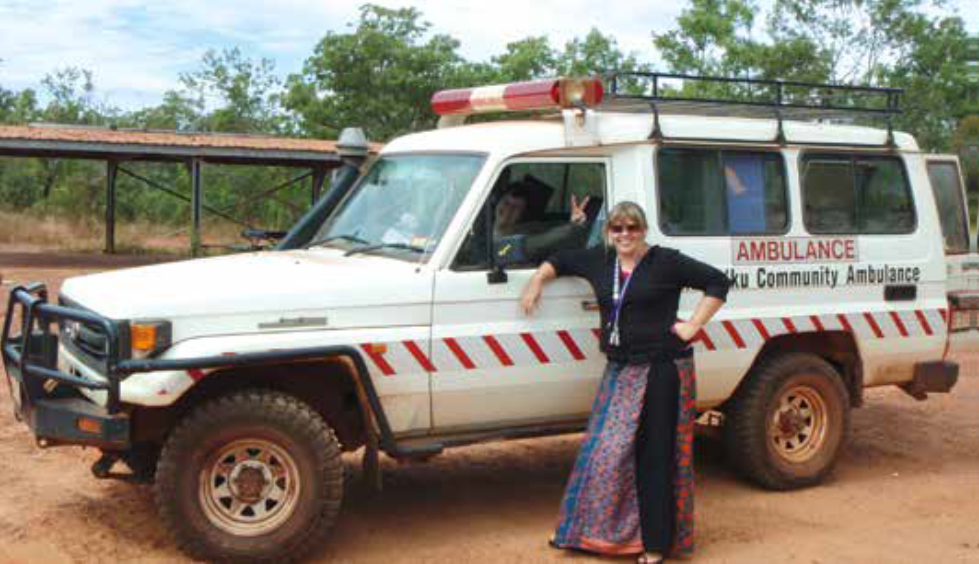Dr Olivia O’Donoghue is a descendant of the Yankunytjatjara people and the Narungga Nations people and proudly identi_es as an Aboriginal woman from both of these nations. Her grandfather on her father’s side was a proud Yankunytjatjara man of the Luritjan tribe near Indulkana on the Anangu Pitjantjatjara Yankunytjatjara (APY) lands in northern South Australia. Unfortunately, he did not have the opportunity to stay on country throughout his youth and instead spent his time at Colebrook Children’s Home in Quorn, South Australia. As a result, he was unable to retain any of his own language and culture. Her father’s mother is descendent from the Narungga Nations people on the Yorke Peninsula in South Australia. Olivia’s father and grandfather are both proud war veterans, having served in Vietnam and Malaysia, respectively. Olivia’s mother’s family are of Irish descent, her mother being one of 16 children.
Throughout medical school, Olivia was passionate about rural and Aboriginal and Torres Strait Islander health. She was fortunate enough to do many rural placements during her clinical years as a medical student, with two months in Gapuwiyak and Galiwinku, both of which are remote Aboriginal communities in north-east Arnhem Land, Northern Territory. She was a member of the Rural Health Club, attended national rural health conferences and helped lobby for increased Aboriginal and Torres Strait Islander health content in education in South Australia and in the curriculum of universities across the nation. Following the completion of her medical degree at the University of Adelaide, she travelled to Alice Springs where she completed her internship and first year in hospital service. Olivia returned home to Alice Springs, as she wanted to gain as much experience as possible in Aboriginal and Torres Strait Islander health early in her career. It was in these early years that Olivia fostered a keen interest in paediatrics and obstetrics. However, after a rewarding primary healthcare experience in the remote community of Galiwinku, she felt torn between paediatrics, obstetrics and specialising in primary healthcare as a GP.

Olivia is now working with Danila Dilba Aboriginal Health Service, predominantly in child and adolescent health. Olivia has worked largely in Aboriginal health since graduating from university and feels she is where she belongs as a clinician. She works for an organisation that is passionate about early childhood issues and providing the primary healthcare needed for Aboriginal children to thrive.
Olivia is also passionate about general practice training and works part time as a medical and cultural educator for Northern Territory General Practice Education.
Olivia believes there have only been modest changes in the health inequities between Aboriginal and Torres Strait Islander peoples and non-Indigenous Australians, especially around life expectancy and infant mortality, and that much needs to be done to attain equality around the social determinants of health. Inequities in housing, education, employment and financial capabilities are major limiting factors in achieving better health outcomes for Aboriginal and Torres Strait Islander peoples. Olivia believes that governments must advocate for true and meaningful reform to improve the social determinants of the health of Aboriginal and Torres Strait Islander Australians. In order to improve health, a long-term plan must be agreed upon by both the major political parties in partnership with Aboriginal and Torres Strait Islander affairs organisations, also taking into account Aboriginal and Torres Strait Islander knowledges and needs.
Family is immensely important to Olivia, and she cherishes the moments she has with her family members. She was born in rural South Australia, and spent her formative years in Alice Springs before attending university in Adelaide. She considers herself a Territorian in heart and spirit and enjoys the tropical weather. Olivia also enjoys the immense cultural diversity of the Darwin community, and its casual lifestyle. She does, however, enjoy visiting the big cities for the shopping, museums and festival opportunities.
Olivia likes to travel and enjoys cooking, movies, music and reading. She studies the Spanish language, plays volleyball, and is a loving and dedicated dog owner. Her passion for life outside of Aboriginal and Torres Strait Islander health is evident in her engagement in the Darwin lifestyle and what it has to offer in markets, festivals, concerts, camping and bushwalking.
First published in: The Royal Australian College of General Practitioners. Closing the gap with the RACGP’s Aboriginal and Torres Strait Islander GPs. East Melbourne, Vic: RACGP, 2016